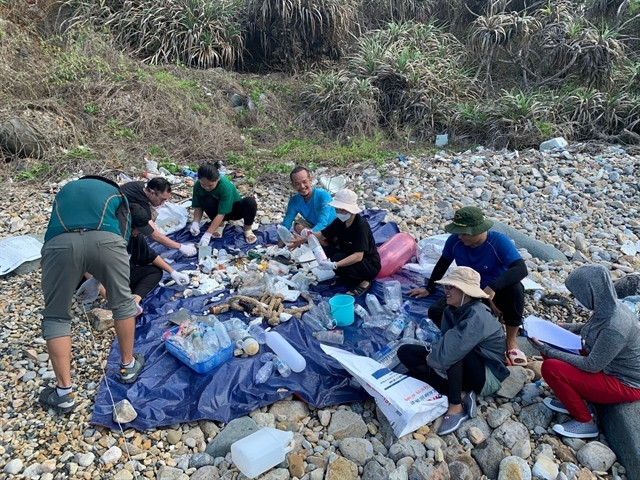 |
| Local people voluntarily collect garbage on Côn Đảo Island. — VNA/VNS Photo |
Many localities in Việt Nam have developed strategies and action plans to raise environmental protections and take measures to reduce plastic waste.
Local authorities of coastal provinces and cities have paid attention to the sustainable development of economic sectors including tourism and effectively exploit marine resources but combined with eco-system protection.
Sea and island tourism has been selected as one of the primary products in the national tourism strategy for the 2021–30 period, with a vision until 2045.
By 2030, all tourist destinations, attractions, lodging facilities and service providers in coastal areas will completely stop using single-use plastics and non-biodegradable plastic bags in order to fulfill the goal of sustainable tourism development, which is linked to environmental preservation and an efficient response to climate change, according to the plan.
An attraction for tourists in southern Kiên Giang Province, Phú Quốc Island, hosts over 5.5 million tourists annually. Despite having the benefit of island tourism resources, Phú Quốc has numerous obstacles in the development of green tourism, including environmental preservation and plastic waste reduction.
The People's Committee of Phú Quốc City is committed to promoting eco-friendly and sustainable growth in several economic areas, including tourism.
By 2025, the city hopes to ban single-use plastics entirely in tourist destinations, seaside services and night market establishments.
About 80 per cent of areas in the Phú Quốc marine protected area will no longer have plastic waste.
Nguyễn Thị Mỹ Quỳnh from World Wide Fund (WWF) for Nature in Việt Nam said they have coordinated with authorities to carry out the project of Phú Quốc looking towards a non-plastic waste island.
Numerous useful activities have been conducted within the project's framework to educate the public, businesses and tourists about environmental protection and the reduction of plastic trash.
In addition, the project has introduced green collection stations to gather rubbish and give out eco-friendly shopping bags to visitors staying at hotels and resorts.
Côn Đảo District, Bà Rịa-Vũng Tàu Province, is another popular island destination for travellers. It strives for sustainable socio-economic development, which includes ecologically friendly tourism expansion, to make this place a top-notch travel destination.
Public knowledge of environmental preservation has been raised through communication initiatives implemented as part of a local circular economy concept.
Both visitors and locals have received training on the classification of garbage at source. Local travel agencies and transportation providers have pledged to cut back on plastic usage in their services.
Côn Đảo District People's Committee and WWF - Việt Nam handed out hundreds of waste classification manuals and bags made from recycled, waterproof fabric to tourism service establishments.
Côn Đảo National Monuments Conservation Centre has implemented the model of 'Say no to plastic bags at Hàng Dương Cemetery'.
The initiative has been put into practice by the Côn Đảo National Monuments Conservation Centre.
The management board of Côn Đảo National Park has coordinated numerous rubbish collection and ocean waste treatment campaigns on roads, beaches and tourist destinations.
Võ Thanh Mỹ, Vice Chairman of Bà Rịa-Vũng Tàu Province Tourism Association, said: “The association has strengthened communication on the tourism business community to actively apply the circular economy model in the island district and minimise the use of disposable plastic products in tourism and service activities.
A large number of lodging facilities and service providers in the area have separated waste at the source, Mỹ said.
A representative of Nicobar Côn Đảo Hotel said glass water bottles have taken the place of plastic ones.
“We provide shampoo and shower gel to visitors in tiny glass bottles that they can reuse multiple times,” the representative told Vietnam News Agency.
The Secret Côn Đảo Hotel uses easily decomposable, eco-friendly waste bags, a RO water filtering system and glass bottles rather than plastic bottles for guest water.
In an effort to reduce its reliance on electricity, the hotel has made an investment in a solar energy system with a 65KWh design capacity per hour.
In order to produce drinking water without using single-use plastic bottles, Six Senses Côn Đảo Resort, which aims to boost zero plastic waste model, has constructed a water filtration system.
Đặng Thu Hiên, a tourist from Hà Nội, said: "Côn Đảo is a spiritual tourism destination familiar to me and many people. While visiting relics on the island, tourists like me have been encouraged to use baskets (to carry worshipping items) without plastic products.
"Although this is a very small action, if every tourist voluntarily adopts the habit, it will help preserve the environment of the Côn Đảo in the short and long term," she said. — VNS